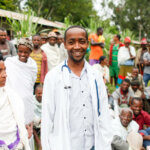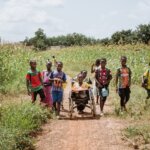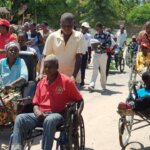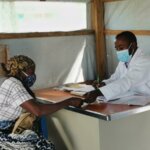- Disability Rights
- Economic Empowerment
- Eye Health
- Humanitarian Action
- Inclusive Education
Thanks to our donors and partners, we’ve turned a hard year into one of mutual support and kindness.

It’s not a stretch to say that 2020 has been … a challenge.
March brought us the coronavirus, a pandemic that has affected everyone – with unequal consequences. Two months later, the murder of George Floyd in the USA unleashed a collective reckoning around race and inequality that continues to sweep the globe.
Yet, in this time of physical distancing and a tragedy that exposed the fault-lines dividing so many of us, communities found ways to connect with and support one another.
At Light for the World, our strength has always come from our adaptability and our unfaltering belief in partnerships. We know that together we’re stronger, and we live that principle in everything we do. We’re also not afraid to try new things. This year, we used some especially creative thinking to keep our programmes running in very trying times – times that have meant serious cuts to NGO funding that some of the most vulnerable communities depend on.
But thanks to your support and collaboration, 2020 has proved to be a year of good things, too. Here are just a few of them – worth remembering and celebrating as this turbulent year draws to a close.
1. Despite the odds, we helped tens of thousands in some of the poorest countries to manage COVID-19.

With your support, we’ve reached at least 10,000 people with disabilities and 40,000 family members through our COVID-19 response. From training in transparent mask-making for deaf and hard-of-hearing communities in Kenya, to engaging remote rural populations in Uganda through a unique series of radio polls, to distributing sanitary products to women with disabilities in Mozambique and giving out nearly €65,000 worth of protective equipment to medical facilities in Burkina Faso, we’ve embraced innovation to reach as many people as possible. We’ve also supported people who have lost work due to the pandemic by training them in new, income-generating skills, like soap-making. And together with the Red Cross, we offered mental health support by telephone to 900 people in Kenya. All told, our COVID-19 response reached 111,890 people in Bolivia, Burkina Faso, Ethiopia, Mozambique, North East India and Uganda.
2. We brought eye care to communities that needed it most.

Working alongside IAPB, our combined lobbying efforts paid off in August when countries pledged to reach the 1 billion people globally who can’t currently access eye care. It was a milestone in eye care that we helped make happen through our vital contributions to the World Report on Vision and our engagement with governments. One of the ways we’re hoping to deliver on this target is through our new 10-year programme, 1, 2, 3… I can see – which we laid the groundwork for this year – in Burkina Faso, Ethiopia, Mozambique and Uganda. The programme aims for earlier detection of eye problems by regularly screening children’s vision, and providing eye glasses or surgery where needed. We’re also helping to train eye doctors. In Burkina Faso where there’s just one eye doctor per 500,000 people, we saw two new ophthalmologists qualifying this year, ensuring that 11 of Burkina Faso’s 13 regions now have a dedicated eye specialist.
3. We demanded education for all, without exception.

Our calls for equitable education for all were a consistent feature of 2020 – vital as COVID-19 continued to sap much-needed resources. In June, UNESCO released its annual Global Education Monitoring (GEM) report. The world’s most comprehensive analysis of education focused on inclusive education this year, and featured substantial input from our inhouse expert, Nafisa Baboo. Together with Action Aid, we urged governments to invest in teaching in the joint report, Bedrock of inclusion, published in October. In November, we reiterated calls for increased funding for early childhood development with the launch of Leave no child behind, a joint report with Open Society Foundations, Global Campaign for Education US and other partners.
4. We improved humanitarian responses in hard-to-reach countries.

Knowing that disasters and emergencies hit marginalised people the hardest, we put the focus on people with disabilities – among the most excluded and forgotten of these communities. In Aid out of reach, people with disabilities who survived a devastating cyclone in Mozambique told us their stories, helping us articulate concrete recommendations to make relief efforts as inclusive as possible. In Bangladesh, we held humanitarian training sessions for NGOs, also with the aim of promoting a more inclusive relief response. In South Sudan, our community-building efforts through sport in conflict-affected areas are taking off. This year, a trainer from the German FC St Pauli blind football team coached a refugee to become a blind football trainer – all via video link due to COVID-19 restrictions. Also in South Sudan, UEFA has approved our We are the champions project, which will allow us to scale up our humanitarian action programme, benefitting some 5,000 children and young people with disabilities in camps for internally displaced people and in schools.
5. We grew our expertise and amplified new voices.

This year, we welcomed two brilliant experts to our fold: global eye health specialist and recent winner of IAPB’s Vision Excellence Award Dr Geoffrey Wabulembo, and academic and top sign language advocate Colin Allen AM. We honoured three exceptional women with the Her Abilities Award, highlighting their achievements and bringing their stories to wider attention. And after years supporting disability advocates in South Sudan to meet and forge alliances, we celebrated the launch of the country’s first ever national union for people with disabilities. In a country riven by war, the union is a timely reminder of what can be achieved when people come together for the common good.



